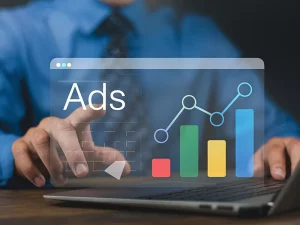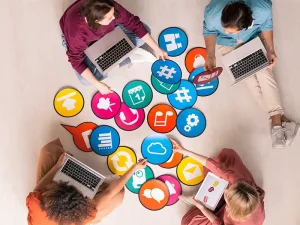Introduction to Artificial Intelligence (AI)
Artificial Intelligence (AI) is no longer just a science-fiction concept. It’s quickly becoming an integral part of our daily lives, transforming industries and enhancing experiences in ways we never imagined. As we look ahead to 2025, the potential applications of AI are expanding at an astonishing rate. From healthcare innovations that save lives to personalized shopping journeys tailored just for you, AI is poised to reshape our world.
This blog explores some surprising use cases of AI that might inspire you as we venture into the future. Each example reveals how this technology can solve real-world problems and elevate human experiences. Whether you’re a tech enthusiast or simply curious about what lies ahead, these captivating scenarios will spark your imagination and show you the limitless possibilities that await us with artificial intelligence.
AI Use Cases in Healthcare
Artificial Intelligence is changing the landscape of healthcare in remarkable ways. Imagine a world where diagnosis happens faster than ever.
AI algorithms analyze medical images with unparalleled accuracy. This technology helps radiologists detect conditions like tumors and fractures, often before they become critical. Early detection can save lives.
Predictive analytics is another game-changer. By examining patient history and genetic information, AI models predict potential health issues before they arise. Doctors can then create personalized prevention plans tailored to individual needs.
Telemedicine also benefits from AI capabilities. Virtual consultations powered by intelligent systems streamline the patient experience, making healthcare more accessible for everyone.
Moreover, chatbots are transforming patient engagement. These virtual assistants provide timely responses to queries and schedule appointments, freeing up valuable time for healthcare professionals to focus on care rather than administration.
Integrating AI into healthcare isn’t just innovative; it’s essential for future advancements in medical treatment and patient outcomes.
AI-powered Virtual Assistants in Customer Service
AI-powered virtual assistants are transforming customer service in remarkable ways. These digital helpers can respond to inquiries 24/7, providing immediate customer assistance.
Their ability to understand natural language means they can easily handle complex queries. Advanced algorithms learn from interactions, continuously improving their responses over time, leading to a more personalized experience for users.
Companies are using these assistants for FAQs, troubleshooting, and order tracking. Customers appreciate the convenience of getting answers without waiting on hold.
Moreover, integrating AI with human agents creates a seamless hybrid approach. Human representatives step in effortlessly when issues escalate beyond the assistant’s capabilities. This blend enhances efficiency while maintaining a personal touch in service delivery.
As businesses adopt these innovative tools, customer satisfaction levels rise dramatically!
Smart Homes and the Internet of Things (IoT)
Smart homes have transformed the way we interact with our living spaces. With the integration of IoT devices, everyday tasks become seamless and efficient. Imagine adjusting your thermostat while sipping coffee or turning off lights remotely.
Smart technology learns from your habits. It anticipates when to turn on security cameras or brew morning coffee. These systems communicate with each other, creating a harmonious home environment tailored just for you.
Energy efficiency is another significant advantage. Smart appliances optimize their energy use based on peak hours, helping reduce bills and carbon footprints.
Moreover, enhanced security features give homeowners peace of mind. From smart locks to video doorbells, monitoring your property has never been easier.
With endless possibilities, the future looks bright for smart homes and IoT innovation. We are only beginning to scratch the surface of what these technologies can achieve together.
Personalized Shopping Experiences with AI
Imagine walking into a store where everything feels tailored just for you. That’s the magic of AI in personalized shopping experiences.
AI algorithms analyze your past purchases and browsing behavior. This data helps retailers recommend products that align with your tastes. Gone are the days of endless scrolling through items that don’t interest you.
Chatbots enhance this experience by providing real-time assistance. They can answer questions, suggest alternatives, or help finalize purchases—all seamlessly integrated into your shopping journey.
Virtual fitting rooms are another exciting innovation. Using augmented reality, you can try on clothes virtually, reducing return rates and enhancing satisfaction.
As brands harness AI technology, expect even more surprises in your shopping routine. Personalized discounts based on preferences could be right around the corner, making every trip feel special and uniquely crafted to meet your needs.
AI in Education: Revolutionizing Learning
AI is transforming education in ways we never imagined. Thanks to adaptive technology that tailors lessons to individual student needs, personalized learning experiences are becoming the norm.
Imagine a classroom where each learner progresses at their own pace. AI algorithms analyze performance data, identifying strengths and weaknesses. Teachers can then focus on areas needing improvement while students thrive in subjects in which they excel.
Moreover, AI-powered tools provide instant feedback on assignments. This immediate response fosters engagement and helps learners correct mistakes promptly.
Beyond academics, virtual tutors offer support outside school hours. They assist with homework and clarify complex topics when teachers aren’t available.
As immersive technologies like augmented reality take center stage, students explore concepts interactively. History comes alive through virtual field trips while science experiments unfold right before their eyes.
The future of education looks promising as AI continues to innovate teaching methods and enhance student experiences.
Conclusion and Future Predictions
As we look ahead to 2025, the potential for AI to reshape various industries is immense. Healthcare will likely see even more refined applications, with predictive analytics assisting in early diagnosis and treatment plans tailored precisely to individual needs.
Customer service may evolve into a seamless experience where AI-powered virtual assistants instantly handle inquiries and resolve issues, leaving human agents free for complex cases. This shift could redefine customer expectations entirely.
Smart homes integrated with IoT devices will become more intuitive. Imagine a home that learns your habits and adjusts itself accordingly—everything from lighting to temperature is controlled effortlessly by AI algorithms.
Retail experiences are also set to be transformed. Personalized shopping could reach new heights with advanced recommendation systems suggesting products based on our preferences and purchasing history before we even realize we want them.
Education is also on the brink of a major transformation. Customized learning paths powered by AI can cater to diverse student needs, making education more accessible and engaging than ever before.
The future holds exciting possibilities for artificial intelligence across multiple sectors. Its influence will continue growing, driving innovation while improving daily life at an unprecedented pace. The journey is just beginning; the next few years promise incredible advancements that we can only begin to imagine today.






